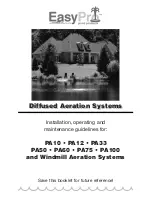
ASDI
Installation, Operation and Maintenance Manual
– SECOND SUN – P/N 51856
13
MAINTENANCE
4
GENERAL REQUIREMENTS
Second Sun
™ is designed for long term trouble free operation. Because of the
nature of its use, and the low maintenance requirements, it is important to
provide scheduled maintenance. Below is a check off list for annual inspections.
I.
Check the heater face and tank surface (under the heater) yearly. Release the heater top latches and
allow the heater to tilt back on the latches. This will allow adequate space to inspect both the heater
surface and the tank surface. The tank surface should be clean and the paint should be intact without
scratches and with no exposed metal. The heater face should be clean and free of debris, ice, snow and
insect nests.
II.
Inspect the catalytic material for holes rips or tears. If holes are present, discontinue use immediately and
ship the heater back to Algas-SDI for repair. Gas can escape from holes in cat material and support open
flame combustion.
III.
Clean obstructions from the cover inlet and exhaust louvers. If the exhaust and/or inlet louvers are
plugged, the heater will not operate correctly and may not reach optimum temperature.
IV.
Do not use high pressure air or water to clean the cat surface. If the heater surface does not reach full
temperature after an hour of operation (850
o
F/454
o
C) and tank pressure is less than 55 psi, contact the
factory for instructions.
V.
The temperature of heater face should be 750-1050
o
F.
VI.
Voltage of the peltier device, measured between terminal 3A and 5A should be 90 mv or higher when the
heater is running. This should measure 300-500 mv when the main valve is actuated. When the heater is
running and only the pilot is actuated it will read 600-1000 mv.
VII.
Inspect the neoprene band holding the temperature switches along its edges for any major cracks that
would affect proper temperature switch contact.
CAUTION
Voltage readings will change depending upon ambient conditions. In colder
environments a higher voltage reading can be expected. In a warmer
climate a much lower voltage reading will be obtained.
The gas valve will work properly as long as a minimum of 300 mv can be
registered when only the pilot is actuated and running.













































